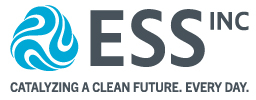ESS’ Energy Center is First LDES Solution to Receive IEEE 693 Rating Demonstrating Resilience Against Seismic Events
ESS’ Energy Center is First LDES Solution to Receive IEEE 693 Rating Demonstrating Resilience Against Seismic Events
Following rigorous testing, achievement of IEEE 693-High demonstrates ESS’ commitment to delivering resilient, safe and sustainable energy storage infrastructure.
WILSONVILLE, Ore.--(BUSINESS WIRE)--ESS Tech, Inc. (ESS) (NYSE: GWH), a leading manufacturer of long-duration energy storage systems (LDES) for commercial and utility-scale applications, today announced that the company’s Energy Center product line has passed rigorous testing and meets the requirements for the highest level of IEEE 693 certification, a widely-accepted seismic rating for energy infrastructure. This standard provides assurance that the Energy Center product line qualifies for deployment as critical infrastructure across the United States. The company is the first non-lithium LDES provider to receive such a rating.
Testing was conducted by the Pacific Earthquake Engineering Research Center at the University of California, Berkeley, and included a shake table test of ESS battery module assemblies and thorough evaluation of Energy Center design. Certification to the IEEE 693 – Level: High standard demonstrates that the Energy Center can withstand acceleration up to 2.5 times the force of gravity and be relied upon to provide power during major seismic events.
“We are committed to providing resilient, high-quality energy storage solutions that customers can rely on when they need them most, especially during extreme weather or natural disasters,” said ESS Chief Technology Officer, Dr. Julia Song. “Achieving IEEE 693 certification for the Energy Center follows rigorous testing and demonstrates the key role for ESS technology in the critical infrastructure powering the clean energy future.”
ESS iron flow battery technology offers numerous safety advantages over incumbent energy storage technologies including significantly lower risk of fire and a safe and sustainable electrolyte primarily made of iron, salt and water. Availability of flexible, safe and resilient LDES technologies will be critical as the world transitions to renewable energy. In regions such as California, a global leader in renewable energy that is also susceptible to significant earthquake activity, energy storage technology must be able to withstand seismic events without sustaining damage or causing power interruptions.
“Thanks to our engineering team’s efforts, we are continuing to develop, deploy and validate cutting edge long-duration energy storage solutions that provide the secure, resilient power that our customers require,” ESS CEO Eric Dresselhuys said. “Achievement of IEEE 693 follows rigorous testing and is an attestation to the quality and reliability of ESS solutions.”
Achievement of IEEE 693 builds on the company’s successful attainment of ETL certification to UL 9540 for the Energy Warehouse and UL 9540A and UL 1973 standards for the company’s core technologies, incorporated into the Energy Center. ETL certification to UL 9540 is currently underway for the Energy Center, further demonstrating the company’s commitment to deliver robust energy storage products to strengthen the grid, enable the deployment of renewable energy and meet the needs of global utilities and energy generators.
About ESS
At ESS (NYSE: GWH), our mission is to accelerate global decarbonization by providing safe, sustainable, long-duration energy storage that powers people, communities and businesses with clean, renewable energy anytime and anywhere it’s needed. As more renewable energy is added to the grid, long-duration energy storage is essential to providing the reliability and resiliency we need when the sun is not shining and the wind is not blowing.
Our technology uses earth-abundant iron, salt and water to deliver environmentally safe solutions capable of providing up to 12 hours of flexible energy capacity for commercial and utility-scale energy storage applications. Established in 2011, ESS Inc. enables project developers, independent power producers, utilities and other large energy users to deploy reliable, sustainable long-duration energy storage solutions. For more information visit www.essinc.com.
Forward-Looking Statements
This communication contains certain forward-looking statements regarding ESS and its management team’s expectations, hopes, beliefs, or intentions regarding the future. The words “estimate”, “expect”, “will” and similar expressions may identify forward-looking statements, but the absence of these words does not mean that a statement is not forward-looking. Examples of forward-looking statements include, among others, statements regarding the status of ESS product development and performance of equipment. These forward-looking statements are based on ESS’ current expectations and beliefs concerning future developments. Many factors could cause actual future events to differ materially from such expectations, including, but not limited to, disruptions, or quality control problems in the Company’s manufacturing operations; as well as those risks and uncertainties set forth in the section entitled “Risk Factors” in the Company’s Annual Report on Form 10-K for the twelve months ended December 31, 2023, filed with the Securities and Exchange Commission (the “SEC”) on March 14, 2024, and its other filings filed with the SEC. Except as required by law, ESS is not undertaking any obligation to update or revise any forward-looking statements whether as a result of new information, future events or otherwise.
Contacts
Investors:
Erik Bylin
Investors@essinc.com
Media:
Morgan Pitts
503.568.0755
morgan.pitts@essinc.com
